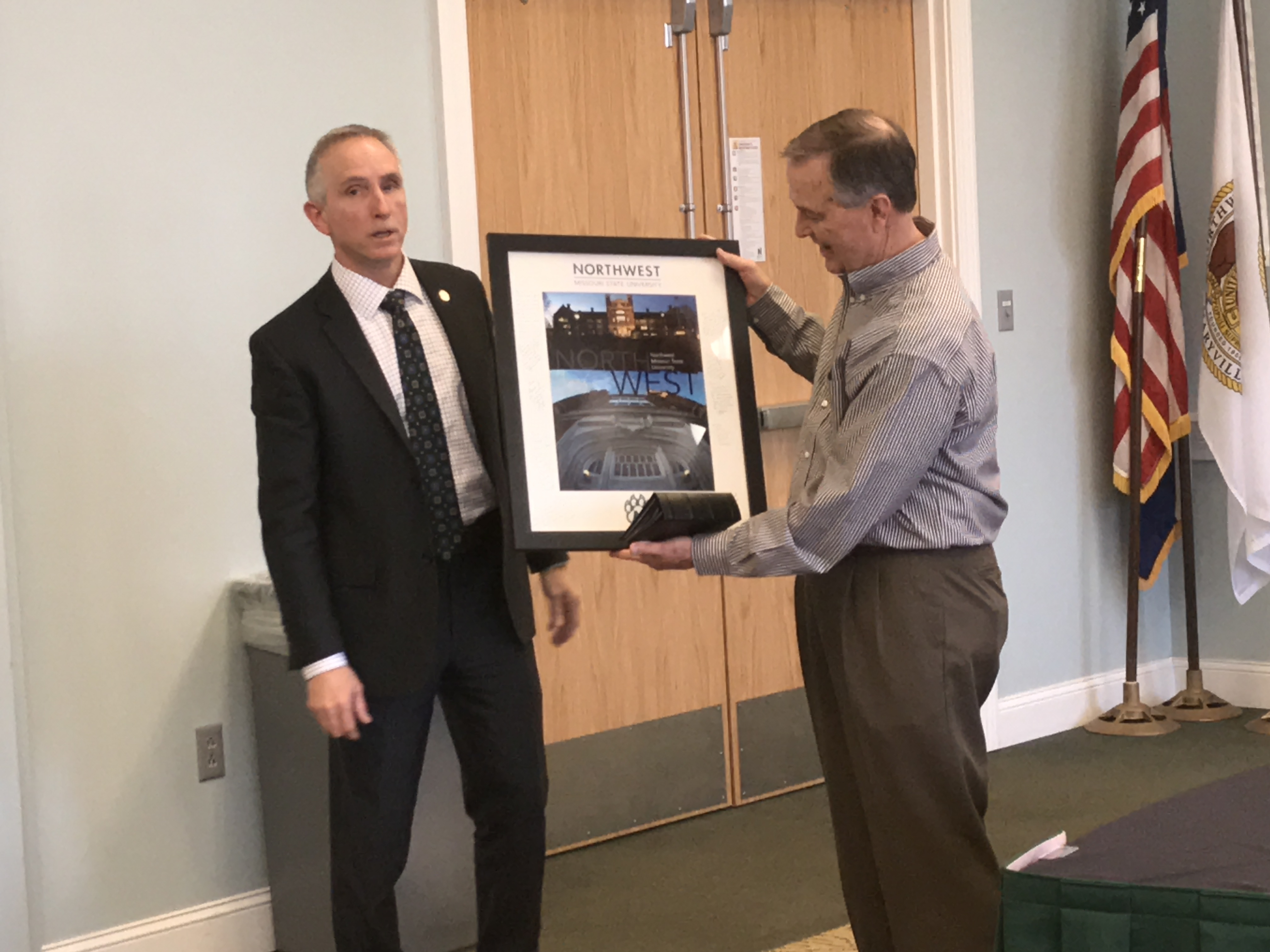Northwest Missouri State University’s Board of Regents, during its regular meeting March 16, approved an increase of the university’s tuition for the 2017-18 academic year in addition to a series of program-specific fees.

Northwest President Dr. John Jasinski presented a Northwest photo to Gene Dorrel, who is a Regent set to resign once the governor appoints a new person.
“What we have done, unequivocally, is fought hard through our budget process to make sure we keep education at Northwest Missouri State University accessible and affordable while still protecting the quality,” Northwest President Dr. John Jasinski told the Regents.
Northwest proposed the tuition increase based on the allowable rate for undergraduate resident tuition and fees established by the annual Consumer Price Index (CPI) and a Missouri statute that limits the state’s colleges and universities from raising tuition above the CPI.
Northwest’s tuition for undergraduate students will increase by 2.8 percent, a sum of CPI rates booked for fiscal years 2017 and 2018. A CPI of 2.1 percent is being implemented for FY18 while a CPI of 0.7 percent was previously booked for FY17 but could only be implemented after state universities received a mid-year appropriations decrease in January. It was estimated that this would be a $195 increase total based on 28 hours per year.
Northwest is not implementing a tuition increase for graduate students due to the marketability.
“Protecting accessibility and affordability while ensuring the enhancement of quality is a primary focus and balancing act in establishing rates,” Northwest Vice President of Finance Stacy Carrick said, adding that Northwest reviews and analyzes respective CPI rates for tuition, housing and meal plans as well as projected inflationary costs such as utilities and health insurance.
Northwest reports that 90 percent of its first-time, full-time students receive some type of financial assistance. Additionally, Northwest’s tuition increases have been among the lowest in the nation during the last eight years while the state of Missouri recorded the third lowest increase nationally during that period.
In addition to tuition rates for 2017-18, the Regents approved a series of discipline-specific program fees to cover costs for non-standard coursework. Discipline-specific program fees are a widely-used mechanism by universities, Carrick explained, to more closely tie the true cost of education to students who benefit from a course of study. It also allows universities to align fees based on program demand, yield, cost and market competitiveness.
Also approved was an increase to board rates, or meal plans, by an average of 2.6 percent, depending on the range of meal plans students select, and an increase of room rates by one percent.
In other business, the Regents approved 86 curriculum changes that include the creation of a master’s program in curriculum and instruction and revisions to the university’s master’s degree in education leadership: K-12 to adopt new national standards for that area. Regents also approved a change to Northwest’s honors program to allow students who enroll with a large number of dual or transfer credits opportunities to earn academic credits through experiential learning programs such as internships, study abroad experiences and service learning.
Approved by the Regents were revisions to chapter two of Northwest’s faculty handbook which details contractual terms and conditions of faculty employment at the university.
Jasinski also recognized Student Senate President Hannah Sears and Regent Gene Dorrel. With elections for the next Student Senate president taking place at Northwest this week, Sears was appearing at the meeting as president of the student governing body for the last time. Dorrel, whose term with the Regents expired January 1, also may have appeared at his last meeting as a regent, pending an appointment by the governor to fill his seat.
Reports were given by Sears, Staff Council President Ashley Henggeler and Jasinski.
The Regents went into closed session for the topics of approval of three closed session minutes, litigation, real estate and personnel issues.




Facebook Comments